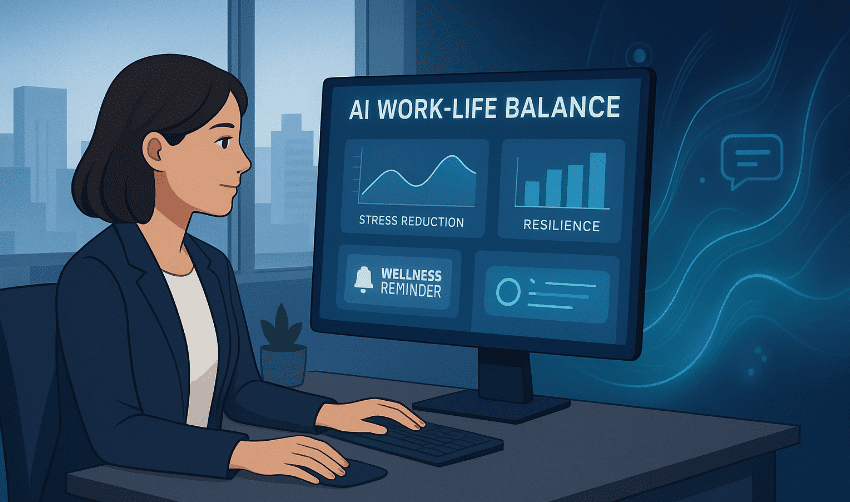Maintaining a healthy work-life balance has become one of the toughest challenges for professionals in high-pressure roles. Executives, managers, doctors, engineers, and entrepreneurs often find themselves stuck in cycles of long hours, tight deadlines, and constant availability. While ambition drives success, it also brings a hidden cost—burnout, stress, and reduced quality of life.
This is where AI work life balance solutions are stepping in. By acting as personalized digital coaches, these tools are helping professionals manage time, reduce stress, and build resilience. Let’s explore how AI balance coaching is reshaping how we approach wellbeing in demanding careers.
Why Work-Life Balance Feels Impossible in High-Pressure Jobs
High-performing professionals face unique challenges:
- Always-on culture: Constant notifications and emails blur the line between work and personal life.
- Unrealistic workloads: Demands often outpace available time and energy.
- Emotional fatigue: Pressure to deliver results can drain mental and emotional reserves.
- Neglected personal wellbeing: Exercise, rest, and family time often take a backseat.
Traditional solutions—like occasional workshops, wellness seminars, or generic stress tips—don’t cut it anymore. What professionals need is real-time, personalized guidance, tailored to their daily challenges. That’s where AI coaching comes in.
How AI Coaching Brings Balance to High-Pressure Roles
AI-driven tools act as digital wellness coaches that learn from your patterns, behaviors, and preferences. Unlike one-size-fits-all wellness programs, they provide actionable, adaptive support. Here’s how they make a difference:
1. Personalized Daily Guidance
An AI coach analyzes your work schedule, habits, and stress levels. It then delivers tailored nudges—whether it’s a reminder to take a 5-minute pause before a meeting or guidance on winding down before sleep.
2. Stress Monitoring in Real Time
With AI-enabled wellbeing trackers, stress signals can be detected through voice tone, typing patterns, or wearable data. When stress spikes, the AI suggests micro-interventions for stress reduction work life, helping professionals regulate emotions on the spot.
3. Building Resilience Against Pressure
High-pressure roles demand resilience. AI resilience work pressure tools guide individuals through cognitive techniques, mindfulness exercises, and reframing strategies that keep them calm under stress and effective in decision-making.
4. Workload Optimization
AI doesn’t just coach on mindset—it helps manage time more effectively. By integrating with calendars, it identifies overloaded schedules and suggests smarter task distribution, ensuring balance is achievable, not theoretical.
AI Personal Wellbeing Tools That Actually Work
A growing ecosystem of AI wellbeing tools is emerging. Some focus on mindfulness, others on stress analytics, and many combine both into integrated platforms. These tools often include:
- Smart journaling prompts to process emotions and track moods.
- Mindfulness reminders that adapt to stress levels.
- AI-powered sleep coaches to improve rest cycles.
- Digital wellness coach dashboards that track progress over weeks and months.
These solutions act like having a supportive coach available 24/7—without the cost or scheduling challenges of human-only coaching.
The Benefits of AI Balance Coaching
When professionals adopt AI balance coaching, the benefits go beyond reduced stress. Some of the most impactful outcomes include:
- Improved decision-making under pressure.
- Reduced burnout risks through early stress detection.
- Better productivity without sacrificing health.
- Enhanced wellbeing across work and personal life.
- Emotional resilience, even during peak workloads
For companies, this translates into stronger retention, fewer sick days, and higher team morale. For individuals, it means regaining control of time, energy, and mental health.
AI Coaching in Action: A Day in the Life
Imagine an executive who starts the day with back-to-back calls. Before the third meeting, her digital wellness coach detects rising stress levels in her voice. A quick breathing exercise notification appears on her smartwatch. Later in the day, when she skips lunch for emails, the AI gently nudges her to take a short break. In the evening, it suggests a reflection activity to mentally “switch off” before spending time with family.
This isn’t science fiction—it’s the daily reality of AI-powered wellbeing support.
The Future of AI for Work-Life Balance
As organizations embrace hybrid work and digital-first operations, the demand for AI work life balance tools will continue to grow. Future innovations will likely include:
- Deeper integration with workplace tools like Slack, Teams, and project management platforms.
- Voice-based AI resilience coaching during meetings.
- Predictive wellbeing analytics that flag burnout risks before they occur.
- Personalized AI mentors blending career growth advice with wellbeing coaching.
This evolution positions AI not as a replacement for human coaching but as a scalable, always-available companion that supports millions of professionals.
Why Organizations Should Care
Companies in finance, healthcare, technology, and consulting are already facing rising burnout and turnover. By adopting AI-driven wellbeing initiatives, they can build more resilient teams. Embedding AI personal wellbeing tools into workplace culture signals commitment to employee wellbeing, creating environments where high performance and balance can coexist.
This aligns with broader strategies like AI for mental wellbeing, workplace mindfulness, and social anxiety solutions, showing that technology can be a force for healthier work cultures.
Final Thoughts
In high-pressure roles, work-life balance may feel out of reach—but with the help of AI work life balance coaching, it’s becoming attainable. These tools act as personalized allies, offering practical strategies for stress management, resilience, and better living.
As digital workplaces evolve, professionals who adopt AI balance coaching won’t just survive the pressure—they’ll thrive with renewed clarity, focus, and wellbeing.







